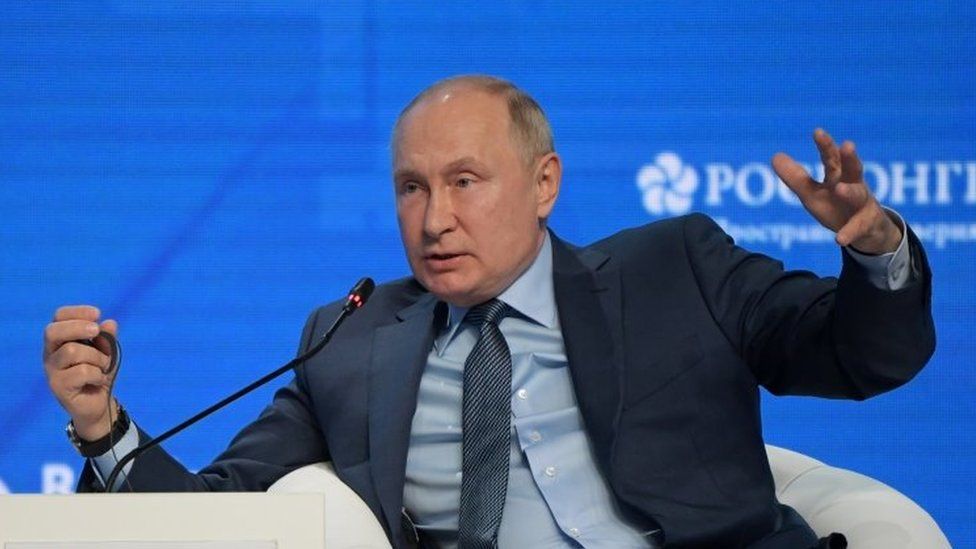Russia has denied using energy as a political weapon, amid surging prices across Europe that have sent gas bills in many households skyrocketing.

Russia, one of Europe’s biggest natural gas providers, has been accused of intentionally withholding supplies.
President Vladimir Putin said such claims were “complete rubbish… and politically motivated tittle-tattle”.
The European Commission has been outlining measures member states can take to combat rising prices.
The wholesale price of gas has increased by 250% since January, triggering a knock-on spike in costs for consumers and businesses.
Energy prices have hit record highs for various reasons, including high demand for natural gas as economies recover from the Covid-19 pandemic.
- EXPLAINED: Why are gas prices so high?
- ANALYSIS: Gas crisis leaves Europe searching for solutions
 IMAGE SOURCE,REUTERS
IMAGE SOURCE,REUTERS‘There is no refusal, none’ – Putin
Speaking at a Moscow energy forum on Wednesday, President Putin blamed the current crisis on Europe, saying that after a cold winter Europeans had not pumped sufficient volumes of gas into storage facilities.
He said it was “very important” to “suggest a long-term mechanism to stabilise the energy market”.
Mr Putin stressed that Gazprom, Russia’s gas giant, was supplying gas to Europe at maximum levels under existing contracts, and was ready to provide more if requested.
“We will increase by as much as our partners ask us. There is no refusal, none,” he said.

Europe’s gas crisis has multiple causes: from a shortfall in renewable energy to low gas stocks after a cold winter. Plus, a surge in demand as countries emerge from the pandemic.
But could another factor be Russia?
In recent weeks Moscow has faced accusations that it has contributed to the crisis and forced gas prices higher by declining to supply additional gas to Europe.
“Politically motivated tittle-tattle,” says President Putin.
But the International Energy Agency believes Russia could do more to increase gas availability to Europe.
Kremlin critics suspect it is using the crisis to fast track European approval for Russia’s controversial new pipeline.
When European regulators sign the paperwork, Nord Stream 2 will carry natural gas from Russia to Germany, bypassing Ukraine.
Opponents of the pipeline believe it is a political project designed to increase Europe’s dependency on Russian energy. Supporters insist it will provide Europe with a cheaper and more efficient supply of gas.
On Wednesday, Vladimir Putin insisted Nord Stream 2 was “a commercial project”.
That was followed by a not so subtle hint. The president said he was “100% certain” that if the pipeline was functioning, that would ease Europe’s energy problems.
What about the new EU measures?
Earlier on Wednesday, the European Commission’s energy chief, Kadri Simson, said the EU’s executive was responding to calls for urgent action by unveiling an “energy price toolbox”.
The toolbox outlines steps member states can take to reduce energy bills in their countries without breaching EU law. It mostly confirms the measures national governments can already use, but considers what more the Commission can do.
Ms Simson said member states were best placed to ease the burden of rising energy prices as winter approaches.
She urged them to consider emergency income support for vulnerable households, state aid for companies, and targeted tax reductions.
She also advised member states to temporarily pause bill payments where necessary, and put in place safeguards to avoid disconnections from the grid.
“Rising global energy prices are a serious concern for the EU,” Ms Simson said. “As we emerge from the pandemic and begin our economic recovery, it is important to protect vulnerable consumers and support European companies.”
On top of those measures, Ms Simson said the Commission would look into the possible benefits of EU countries jointly buying natural gas.
She said countries could collectively buy gas to form a strategic reserve. But, like the joint scheme to buy Covid vaccines, participation would be voluntary.
The idea was proposed recently by governments that want more EU intervention, such as Spain.
All member states were encouraged to use the EU’s €750bn (£636bn; $867bn) Covid-19 recovery fund to invest in clean energy to meet the bloc’s climate targets.
“We are not facing a surge because of our climate policy,” Ms Simson said. “Fossil fuel prices are spiking. We need to speed up the green transition, not slow it down.”


No comments:
Post a Comment
Note: only a member of this blog may post a comment.